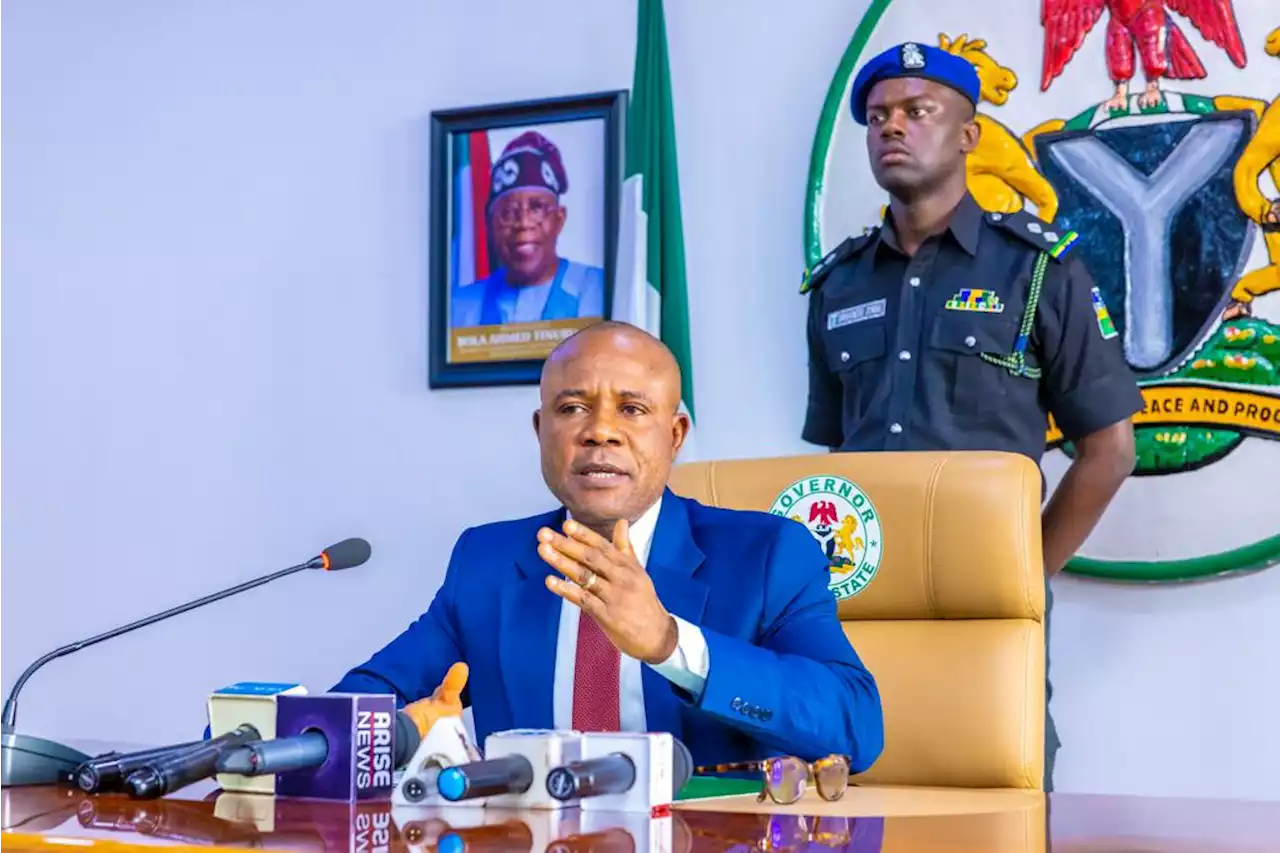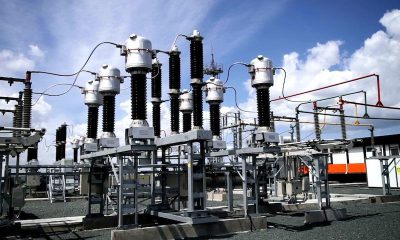NEWS
FG Begins Distribution of Empowerment Items to 3,500 North Central Women

From Joseph Amedu, Lokoja
The Federal Government under its Renewed Hope Initiative (RHI) Agenda, has started distributing sustainable empowerment equipment to 3,500 women across North central zone including the Federal Capital Territory (FCT).
The distribution was carried out through the Office of the Senior Special Assistant to the President (OSSAP) on Sustainable Development Goals (SDGs) in collaboration with the office of the First Lady, Sen.
The First Lady, who flagged off the distribution in Lokoja, at the weekend, said 500 women would benefit from each state in the North Central zone namely Benue, Kogi, Kwara, Nasarawa, Niger, Plateau, and the FCT.
Mrs Tinubu, who was represented by the wife of Kogi state Governor, Hajia Sefinat Usman Ododo, said the empowerment items would cover 18,500 women across the six geopolitical zones, for poverty alleviation and increased entrepreneurship activities.
She commended the SSA to the President on SDGs, Princess Adejoke Orelope-Adefulire and her team for the gesture towards women’s empowerment in achieving all the SDGs in the country.
“This empowerment will benefit 18,500 women across the country’s six geopolitical zones.
“The North Central zone is the first to benefit from this program, and today, the women will be given items such as Deep-chest freezers, Maxi Gas cookers with Ovens, Generators, and Industrial Grinding Machines to start or grow their existing businesses.
“These items will be distributed by the State First Ladies/RHI State Coordinators in the North central zone. By the grace of God, the South-South Zone will be the next beneficiary,” she said.
The first lady stressed that the initiative recognised the critical role women played in nation-building.
This, she said, aligned with the Renewed Hope Agenda of President Bola Tinubu, which prioritises inclusivity, economic growth, and sustainable development for all Nigerians, particularly women’s economic empowerment.
She, therefore, advised the beneficiaries to use the resources judiciously to start or grow their businesses.
“The items being distributed today are to equip our women with the necessary tools and resources they need to build successful businesses and to contribute to the prosperity of our great nation” she added.
“To the beneficiaries, let these items serve as a foundation for creating better life for yourselves and your families. I hope and pray that what you receive today will prosper in your hands” she also said.
Earlier, the SSA to the President on SDGs, Princess Adejoke Orelope-Adefulire, said the initiative was a bold step towards empowering Nigerian women across the 36 states and the FCT.
Orelope-Adefulire, who was represented by Special Adviser to Kogi Governor on SDGs, Mr Usman Musa, appreciated the first lady for her visionary leadership and unwavering dedication to improving the lives of women across Nigeria.
Orelope-Adefulire stressed that the first lady’s RHI program, has continued to serve as a beacon of empowerment and economic transformation, aligning seamlessly with our national development priorities and the SDGs.
“Today’s programme is not just about distributing empowerment items; it is about unlocking potential, fostering economic independence and creating opportunities for women to thrive.
“By equipping 500 women per state and the FCT with tools such as gas cookers, generators, deep freezers and grinding machines, we are strengthening their capacity to build sustainable livelihoods and contribute meaningfully to inclusive national development,” she said.
She noted that the OSSAP-SDGs has, over the years, strengthened efforts at empowering women and children including the construction and equipping of 66 Skills Acquisition Centres and Transit Homes for women and girls across the country.
She added: “These were supported with over 4, 800 computers for ICT training.
“This investment reflects our firm belief that when a woman is empowered, a home is built, a community is strengthened, and a nation prospers.
“Indeed, recent evidence has shown that women entrepreneurs contribute significantly to Nigerian economic development through employment generation, poverty eradication and basic family support.
“Thus, I encourage our beneficiaries today to make the most of this opportunity.
“Let these empowerment tools towans serve as stepping stones towards financial independence, business development and sustainable livelihood”.
Orelope-Adefulire reaffirmed the President’s commitment to the achievement of the SDGS in Nigeria.
Some of the beneficiaries; Mrs Khadijat Abdullahi from Okehi; Mrs Hannah Mohammed from Ibaji; and Dorcas Olayemi from Kabba-Bunu LGA, jointly appreciated the federal government for the gesture.
NEWS
Conference: Nigeria 10 Years Behind in Renewable Energy Adoption – Expert

The General Manager, Corporate Services, NLNG, Mr Ekeinde Ohiwerei, says Nigeria is 10 years behind in renewable energy adoption, adding that its energy sector emits 13.3 billion tons of gas yearly.Ohiwerei noted this during a panel discussion at the IoT West Africa Data Centre, Cloud Expo, Power and Water annual conference in Lagos on Wednesday.
The theme of the panel discussion was: “The Digital Revolution in Oil and Gas – Advancing Efficiency, Automation and Sustainability. ”Ohiwerei stressed that the country was working hard to reduce emissions.“We have some clear paths to reducing emissions: one is to control the emissions, the other is to reduce it.“We also need a lot of work on climate change. We need to invest in things like gas streams and some other resources,’’ he said.Ohiwerei noted that there were opportunities to become smarter about electricity management, particularly in embedded infrastructure.“The next 10 years will be crucial in shaping the future of renewable energy and Artificial Intelligence in sustainability in the nation.“We have potential for significant progress in reducing emissions and promoting efficient energy use,” the NLNG boss said.Ohiwerei added that the footprints of renewable energy was sometimes not very apparent.He noted that manufacturing was finding huge applications in both environmental and technological aspects of renewable energy.Also speaking at the panel discussion, Mr Alexey Ushakov, Business Development Manager, Cummins Inc., emphasised the need to control emissions and transition to sustainable fuels to mitigate environmental impact.“My take on it will be, first of all, we need to control emissions,” he said.Ushakov said that his organisation embedded an emissions reduction strategy in its system in 2013, with a goal to achieve zero emissions by 2030.He said: “We will be trying to control and reduce emissions to a minimum in 2030. And this emission zero, it’s called, we are going to zero emissions.”He highlighted the importance of shifting from diesel engines to sustainable fuels like Hydrotreated Vegetable Oils (HVOs) and multi-fuel synthetic diesel engines, which produce fewer emissions.Ushakov noted that alternative technologies like batteries and solar panels had potential, but also posed challenges.“The second way is much more, I would say, harder for us, for humanity because you need to always think backwards to produce this much of batteries and solar panels,” he said.Ushakov emphasised the need for a balanced approach, combining emission control with sustainable fuel solutions.“We need to mix and blend all these two types and move forward,” he said.Ushakov also highlighted the role of analytics in finding solutions, saying “Analytics comes from the big data. The more data we use, the more ways we can figure it out.”Other energy and technology sector experts on the panel highlighted the future of technology and sustainability in various industries, emphasising the importance of Artificial Intelligence, data analytics, and renewable energy.They said that industries must work together to harness the potential of digital tools and sustainable practices to create a better future.The experts’ discussion centred on how industries could leverage digital tools to improve efficiency, reduce costs, and promote sustainability.NAN reports that the Conference and Exhibition will run from May 13 to May 15. (NAN)NEWS
Poor Power Supply; Our Businesses are Folding up– Business Owners

Many small business owners in the Federal Capital Territory (FCT), say their businesses are folding up due to epileptic power supply.The residents, especially business owners, spoke to the Newsmen on Wednesday in Abuj.The electricity consumers, who reside in Kubwa and environs, Kuje, Gwagwalada, Aco Estate decried the poor state of power supply in their areas.
According to them, power supply has declined recently compared to how it has been in the past few months. Mrs Amanda Okoye, a Fashion Designer in Kubwa said that the situation was so bad that for weeks she had not been able to meet up with her customers’ demands.“We have not had electricity for close to three days now. I have to depend on generator and getting the fuel to power it is expensive because of the increase in the pump price of the product.“It has been so bad that I have decided to close the business for now till power supply improves in the area.“The situation we face here is close to darkness and this has not been easy with me at all as my customers are complaining seriously and this is not good for my business.“I am appealing to the government and Abuja Electricity Distribution Company (AEDC) to do something about the power situation as a matter of urgency ’’ she said.Mr Collins Osahon a Barber residing at Kubwa said that the situation was getting worse as they do not have power for more than two hours a day.Osahon said that he had to rely on generator to do his business, adding that because of the high cost of fuel, he had increased the cost of barbering a customer’s hair.According to him, sometimes they switch on the light in the night when everyone is asleep and this has reduced patronage which can lead to business folding up.Also speaking, Mr Amos Okoduwa, a Welder residing at Kuje said that electricity was not too regular in his area as it was before.He said; ’’we only have light for four to five hours a day and sometimes they don’t get it for a whole day.“I am appealing to the government to improve power supply to the area to enable me run my business effectively so that I can feed my family,’’ he said.Mrs Comfort Maduka, who operates a cold room in Kuje, FCT also said that electricity was not constant in her area.Maduka said that the government and AEDC should do their best to improve power supply, especially as consumers were paying for the servicesShe said that she had to lock up the cold room because her goods were perishing as she could not afford the high cost of diesel to power her generator‘I am appealing to government to improve power supply so that I can come back to business.” she said.Mr Okon Etim, who runs a laundry service in ACO Estate on Airport Road, said that the light situation in the area wa terrible compared to before.Okon said that the area does not have power supply for more than five to six hours in a day, adding that the light goes off every 20 minutes.”I don’t know what to do so I have to close down my business until I am able to buy a big generator that I can use for the business, he said.The Minister of Power, Mr Adebayo Adelabu said that the ministry of power remains steadfast in addressing the challenges within Nigeria’s energy sector.“We acknowledge the economic hardships faced by many Nigerians and reaffirm our commitment to stabilising the grid, expanding access, and fostering investor confidence.“Recent reforms, such as the ongoing upgrade of transmission infrastructure and partnerships with renewable energy developers are pivotal to achieving sustainable solutions,” he said.The minister urged Nigerians to continue to support government policies and initiatives.He also called on Nigerians to report illegal activities such as energy theft and tampering with power infrastructure.“Let us also embrace energy-efficient practices to reduce strain on the grid.“As emphasised by President Bola Tinubu’s “Renewed Hope Agenda”, collective resilience and patriotism are vital to overcoming national challenges.” he said. (NAN)DEFENCE
Road Construction: Gov Mbah Meets UN Road Safety standards- FRSC

The Federal Road Safety Corps (FRSC) says the ongoing road reconstructions in Enugu State by the Gov Peter Mbah led administration, meet the United Nations (UN) Sustainable Development Goals on road safety.
The Sector Commander of FRSC Enugu State Command, Mr Franklin Agbakoba, made the observation on Wednesday in Enugu during a press briefing for the commemoration of the 8th UN Global Road Safety Week in the state.
The theme for the 8th UN Global Road Safety Week is: ‘Make Walking Safe, Make Cycling Safe’, and it runs from May 12 to May 18, 2025.
Agbakoba noted that with the spacious walkways and putting other necessary road furniture such as well-designed bus stops and lighting, the Gov.
Mbah led administration had achieved one of the major goals of the UN.According to him, with new road design with spacious walkways and other furniture made compulsory in all roads, Gov. Mbah has prioritised the safety and security of pedestrians walking in all major roads within the state.
Agbakoba noted that during the event, the FRSC stakeholders and the Command awareness would be focusing on education that dealt with safety of vulnerable road users, who were those walking and cycling within roads in cities and communities.
He explained that the event was meant to reinforce collective responsibilities in making road safer for everybody as
established in 2007 by the UN General Assembly as efforts would spotlight the need to prioritise non-motorised transportation safety.
“As a Corps, we have continued to generate strategies to meet these glaring challenges. We have intensified our public enlightenment campaigns both in the state and nationwide.
“The establishment and sustenance of road safety clubs in schools to catch-them-young and ensured walkways, Zebra Crossing and cycling lanes are incorporated into new and existing road projects.
“FRSC is also monitoring drivers’ behaviour in high-risk routes, enforce speed limits and also ensure well-structured safety education for children and youths to imbibe positive road culture and habits,” he said.
He urged road safety stakeholders in the state to sustain the call for action meant to build a road environment and culture where pedestrians and cyclists were protected and where no life was lost needlessly on the roads.
“As a lead agency in road safety administration and traffic management, FRSC will continue to drive interventions to save lives, but we cannot do this on our own; we needed everyone’s support and cooperation,” he added.
The week long event included: a press briefing, sensitisation rally and distribution of fliers, strategic visit to selected schools for safety education and Road Safety Officers’ Wives Association (ROSOWA) visit to fleet operators.
Others are: commemorative juma’at prayer on Friday, ROSOWA visitation to orphanage homes and commemorative church service on Sunday among others. (NAN)


















